If you’ve been tracking the Solar Impulse Across America tour, I’m probably going to make you a bit jealous. The Solar Impulse landed at the DFW International Airport on May 23rd and made the plane available for public viewing. Here’s a great shot they took of the landing. When I heard about the public viewing, I went to their website for details. Unfortunately, all viewing times were sold out. It’s an odd use of the term “sold out,” since the passes were free. I placed my name on a reserve list, in case any more showings were scheduled and sent an email asking if they had any showings for the media or bloggers. Unfortunately they did not.
A couple days later I received an email from the team saying they had scheduled another day of viewing, so I immediately reserved a slot at the first showing of the day.
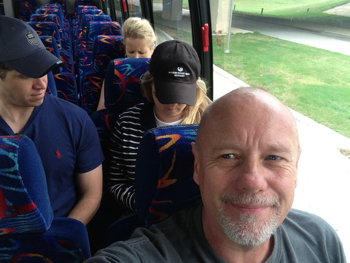
They had set up free parking in a remote lot and had shuttle buses to take attendees to the plane’s location. I was surprised that the lot looked pretty crowded even though this was the earliest viewing. As I walked to the bus, I saw all ages of people looking excited to see the Solar Impulse. There were so many buses in service that there was virtually no waiting.
As I rode over to the plane, I envisioned a gossamer-thin, light aircraft and wondered how it could handle the rough weather we’d had lately. In fact, it was only three days after the Moore, Oklahoma tornado that the Solar Impulse landed at DFW. Not only that, but what about turbulence from the jets flying in and out? I had questions.

The morning was overcast and felt like rain would be coming soon when we spotted the hanger. The hanger was a huge tent and there were barricades as if they were expecting unruly throngs pushing to get in. The crowd was smaller than that by far. There were police everywhere and in some ways going through security felt like I was leaving on a jet plane myself. (Sorry. I had to. Big John Denver fan)
 Anyway, there were all sorts of posters in the first building we entered, touting renewable energy and the flight’s sponsors, so I felt right at home. We passed through the first building and walked across the tarmac to the hangar.
Anyway, there were all sorts of posters in the first building we entered, touting renewable energy and the flight’s sponsors, so I felt right at home. We passed through the first building and walked across the tarmac to the hangar.
We entered the tent and there it was.
Holy cow, that things HUGE! And there were tons of people of all ages checking her out.
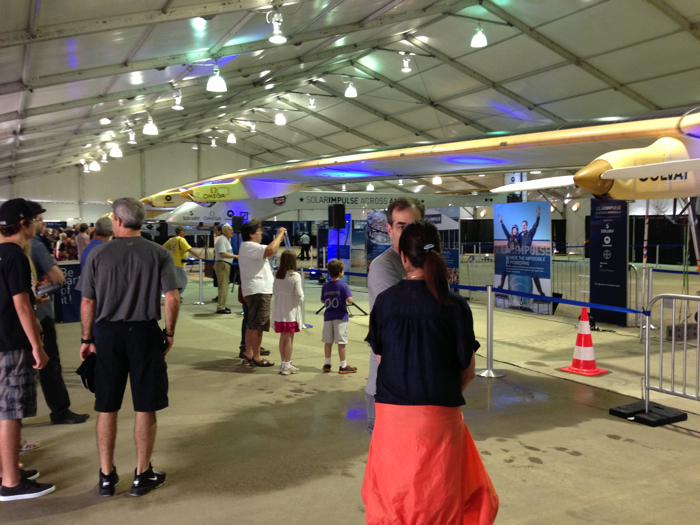 I had expected the wings to be oriented parallel to the side of the tent with “Solar Impulse” written across it. The wingspan was far too long to do that. The tips of the wings were not very far from each end of the tent. My first impression was that the plane is much sturdier than I had anticipated the fuselage, at the center of the plane’s wings, had a pretty packed-looking cockpit which didn’t look very comfortable at all. (but I would have loved to sit in it nonetheless…)
I had expected the wings to be oriented parallel to the side of the tent with “Solar Impulse” written across it. The wingspan was far too long to do that. The tips of the wings were not very far from each end of the tent. My first impression was that the plane is much sturdier than I had anticipated the fuselage, at the center of the plane’s wings, had a pretty packed-looking cockpit which didn’t look very comfortable at all. (but I would have loved to sit in it nonetheless…)
Here’s a wide angle view.
(click on image for larger pic)
There were four propellers spaced along the wings and atop the wings, the entire surface as covered with solar panels. There were large television screens scattered along the length of the plane, all playing videos about it. In the rear of the hangar, there was a theater set up with additional video presentations running. But the best part, by far, was that every 30 feet or so, there was a Solar Impulse team member available to answer questions. And answer they did! Everyone seemed to have tons of questions for them. Some of them would complain that their English wasn’t very good, but I thought they communicated very well and could understand them over the noise of others talking, video programs running and the general hubbub.
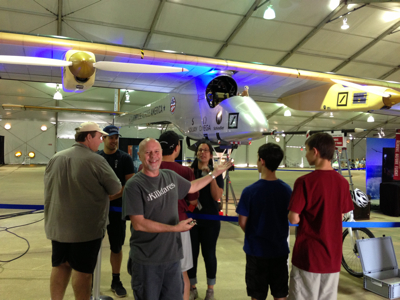 The first person I talked to was a tall young man named Peter. I asked about the turbulence and landing. He said the reason they landed around 1:00 in the morning was that the airport traffic was shut down then, eliminating the worry of jet-induced turbulence. He said they normally have a limit of 5 MPH crosswinds for landing but that the DFW landing occurred in around 15 MPH crosswinds. Believe it or not, the Solar Impulse flies as high as 30,000 feet. Silly me. I had envisioned it at about 500 feet…
The first person I talked to was a tall young man named Peter. I asked about the turbulence and landing. He said the reason they landed around 1:00 in the morning was that the airport traffic was shut down then, eliminating the worry of jet-induced turbulence. He said they normally have a limit of 5 MPH crosswinds for landing but that the DFW landing occurred in around 15 MPH crosswinds. Believe it or not, the Solar Impulse flies as high as 30,000 feet. Silly me. I had envisioned it at about 500 feet…
Obviously, if they can fly at night, when the sun is not up, they must have battery packs. Peter told me that, much like my Volt, the panels charge the batteries and the batteries run the motors. The solar arrays do not power the motors directly. He said each or the four motor housings also hold a 24 kW battery pack, for a total of 96 kilowatts! They try to keep flight time to 8 hours or less, not due to battery limitations, but for the sake of the pilot.
Next up, I spoke with another team member named Lorraine. I’m spelling that phonetically as I forgot to ask him about the spelling. He and I spoke on video, so as soon as I have it edited, I’ll link it to this post. One of the questions I had for him was, since the plane was in a tent now and not soaking up the sun’s rays, if they had a way to plug the battery packs in to recharge the batteries. Surprisingly, they don’t. If I understood him correctly (it was noisy and he had a pronounced accent) the packs can charge in only an hour when exposed to sunlight.
Their next stop is St. Louis. If you’re within driving distance, it’s well worth your time to check this wonderful plane out!
This slideshow will take you from one end of the plane to the other…almost.

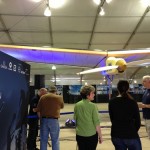

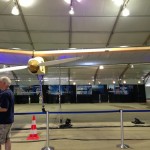
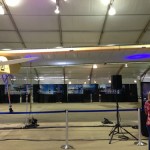
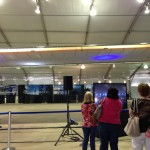
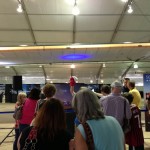

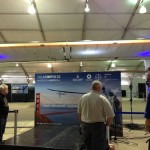
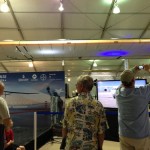
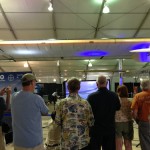
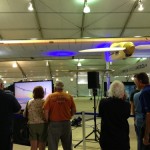
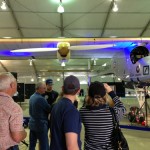
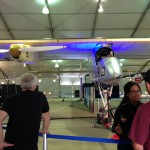
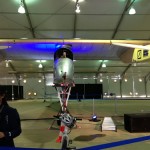
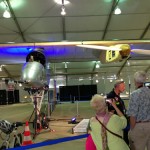
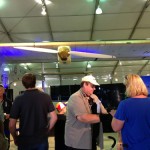
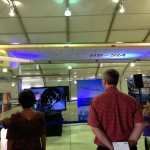
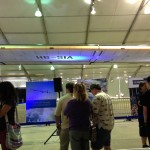
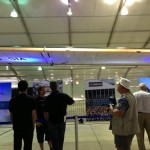

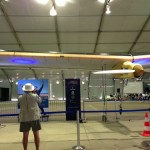
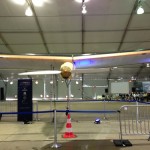
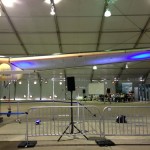
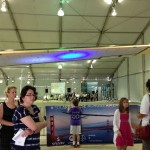
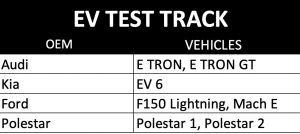
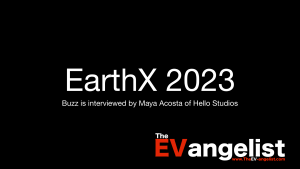
Cool!!!!
Thanks Buzz…. Look forward to the videos